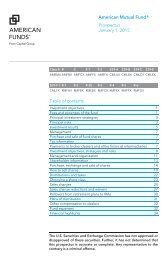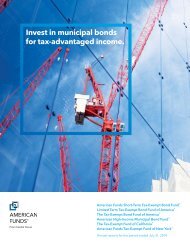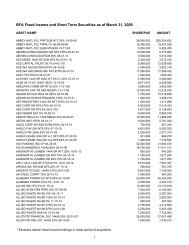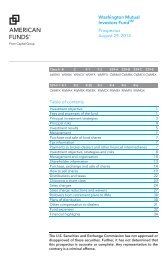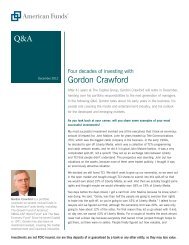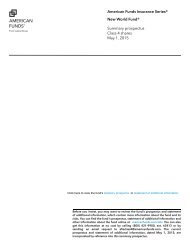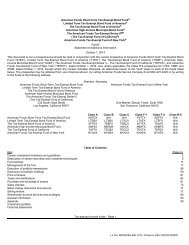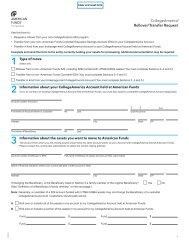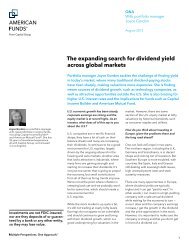later settlement date. However, securities to be delivered must meet specified criteria, including face value, coupon rate and maturity,and be within industry-accepted “good delivery” standards.The fund will not use these transactions for the purpose <strong>of</strong> leveraging and will segregate liquid assets that will be marked to marketdaily in an amount sufficient to meet its payment obligations in these transactions. Although these transactions will not be entered int<strong>of</strong>or leveraging purposes, to the extent the fund’s aggregate commitments in connection with these transactions exceed its segregatedassets, the fund temporarily could be in a leveraged position (because it may have an amount greater than its net assets subject tomarket risk). Should market values <strong>of</strong> the fund’s portfolio securities decline while the fund is in a leveraged position, greaterdepreciation <strong>of</strong> its net assets would likely occur than if it were not in such a position. The fund will not borrow money to settle thesetransactions and, therefore, will liquidate other portfolio securities in advance <strong>of</strong> settlement if necessary to generate additional cash tomeet its obligations. After a transaction is entered into, the fund may still dispose <strong>of</strong> or renegotiate the transaction. <strong>Additional</strong>ly, prior toreceiving delivery <strong>of</strong> securities as part <strong>of</strong> a transaction, the fund may sell such securities.Repurchase agreements — The fund may enter into repurchase agreements under which the fund buys a security and obtains asimultaneous commitment from the seller to repurchase the security at a specified time and price. Because the security purchasedconstitutes collateral for the repurchase obligation, a repurchase agreement may be considered a loan by the fund that iscollateralized by the security purchased. Repurchase agreements permit the fund to maintain liquidity and earn income over periods<strong>of</strong> time as short as overnight. The seller must maintain with the fund’s custodian collateral equal to at least 100% <strong>of</strong> the repurchaseprice, including accrued interest, as monitored daily by the investment adviser. The fund will only enter into repurchase agreementsinvolving securities in which it could otherwise invest and with selected banks and securities dealers whose financial condition ismonitored by the investment adviser. If the seller under the repurchase agreement defaults, the fund may incur a loss if the value <strong>of</strong>the collateral securing the repurchase agreement has declined and may incur disposition costs in connection with liquidating thecollateral. If bankruptcy proceedings are commenced with respect to the seller, realization <strong>of</strong> the collateral by the fund may be delayedor limited.The fund may also enter into reverse repurchase agreements. A reverse repurchase agreement involves the sale <strong>of</strong> a security by afund and its agreement to repurchase the security at a specified time and price. The fund will segregate liquid assets that will bemarked to market daily in an amount sufficient to meet its payment obligations under reverse repurchase agreements with brokerdealers(no collateral is required for reverse repurchase agreements with banks).Restricted or illiquid securities — The fund may purchase securities subject to restrictions on resale. Restricted securities may onlybe sold pursuant to an exemption from registration under the Securities Act <strong>of</strong> 1933 (the “1933 Act”), or in a registered public <strong>of</strong>fering.Where registration is required, the holder <strong>of</strong> a registered security may be obligated to pay all or part <strong>of</strong> the registration expense and aconsiderable period may elapse between the time it decides to seek registration and the time it may be permitted to sell a securityunder an effective registration statement. Difficulty in selling such securities may result in a loss to the fund or cause it to incuradditional administrative costs.Securities (including restricted securities) not actively traded will be considered illiquid unless they have been specifically determinedto be liquid under procedures adopted by the fund’sPage 8
oard <strong>of</strong> trustees, taking into account factors such as the frequency and volume <strong>of</strong> trading, the commitment <strong>of</strong> dealers to makemarkets and the availability <strong>of</strong> qualified investors, all <strong>of</strong> which can change from time to time. The fund may incur certain additionalcosts in disposing <strong>of</strong> illiquid securities.Investing outside the U.S. — The fund may only invest in securities outside the U.S. that are U.S. dollar-denominated and are in thethree highest rating categories. Accordingly, the risks described below are substantially lessened.Investing outside the United States involves special risks, caused by, among other things: fluctuating local currency values; differentaccounting, auditing, financial reporting, disclosure, and regulatory and legal standards and practices; changing local and regionaleconomic, political, and social conditions; expropriation or confiscatory taxation and greater market volatility. However, in the opinion<strong>of</strong> the fund’s investment adviser, investing outside the United States also can reduce certain portfolio risks due to greaterdiversification opportunities.The risks described above may be heightened in connection with investments in developing countries. Many <strong>of</strong> these developingcountries may be referred to as emerging countries. Although there is no universally accepted definition, the investment advisergenerally considers a developing country as a country that is in the earlier stages <strong>of</strong> its industrialization cycle with a low per capitagross domestic product (“GDP”) and a low market capitalization to GDP ratio relative to those in the United States and the EuropeanUnion. Historically, the markets <strong>of</strong> developing and emerging countries have been more volatile than the markets <strong>of</strong> developedcountries. The fund may invest in securities <strong>of</strong> issuers in developing and emerging countries only to a limited extent.In determining the domicile <strong>of</strong> an issuer, the fund’s investment adviser will consider the domicile determination <strong>of</strong> a leading provider <strong>of</strong>global indexes, such as Morgan Stanley Capital International, and may also take into account such factors as where the company’ssecurities are listed and where the company is legally organized, maintains principal corporate <strong>of</strong>fices and/or conducts its principaloperations.Cash and cash equivalents — The fund may hold cash or invest in cash equivalents. Cash equivalents include (a) commercial paper(for example, short-term notes with maturities typically up to 12 months in length issued by corporations, governmental bodies orbank/corporation sponsored conduits (asset-backed commercial paper)); (b) short-term bank obligations (for example, certificates <strong>of</strong>deposit, bankers’ acceptances (time drafts on a commercial bank where the bank accepts an irrevocable obligation to pay atmaturity)) or bank notes; (c) savings association and savings bank obligations (for example, bank notes and certificates <strong>of</strong> depositissued by savings banks or savings associations); (d) securities <strong>of</strong> the U.S. government, its agencies or instrumentalities that mature,or may be redeemed, in one year or less; and (e) corporate bonds and notes that mature or that may be redeemed, in one year orless.Variable and floating rate obligations — The interest rates payable on certain securities in which the fund may invest may not befixed but may fluctuate based upon changes in market rates or credit ratings. Variable and floating rate obligations bear coupon ratesthat are adjusted at designated intervals, based on the then current market rates <strong>of</strong> interest or credit ratings. The rate adjustmentfeatures tend to limit the extent to which the market value <strong>of</strong> the obligations will fluctuate.Page 9
- Page 1 and 2: American Funds Mortgage Fund ®Part
- Page 3 and 4: Description of certain securities a
- Page 5 and 6: Mortgages underlying most ARMS, how
- Page 7: Certain rights provided to holders
- Page 11 and 12: Fund policiesAll percentage limitat
- Page 13 and 14: Management of the fundBoard of trus
- Page 15 and 16: Name, age andposition with fund(yea
- Page 17 and 18: Name, age andposition with fund(yea
- Page 19 and 20: Name, age andposition with fund(yea
- Page 21 and 22: Dollar range 1of fundshares ownedAg
- Page 23 and 24: different transfer agent fees and o
- Page 25 and 26: the committee. The nominating and g
- Page 27 and 28: First Clearing, LLCCustody AccountS
- Page 29 and 30: Investment adviser — Capital Rese
- Page 31 and 32: investment adviser may delegate all
- Page 33 and 34: During the 2012 fiscal year, admini
- Page 35 and 36: Following is a brief description of
- Page 37 and 38: Other compensation to dealers — A
- Page 39 and 40: Execution of portfolio transactions
- Page 41 and 42: among the funds and other accounts
- Page 43 and 44: Subject to board policies, the auth
- Page 45 and 46: sales, at the last available bid pr
- Page 47 and 48: Taxes and distributionsDisclaimer:
- Page 49 and 50: countries. The application of the f
- Page 51 and 52: Your bank should include the follow
- Page 53 and 54: Frequent trading of fund shares —
- Page 55 and 56: Sales chargesClass A purchasesPurch
- Page 57 and 58: Moving between accounts — Investm
- Page 59 and 60:
Shareholders purchasing shares at a
- Page 61 and 62:
life insurance policies that were e
- Page 63 and 64:
Selling sharesThe methods for selli
- Page 65 and 66:
Automatic exchanges — For all sha
- Page 67 and 68:
General informationCustodian of ass
- Page 69 and 70:
Summary prospectuses, prospectuses,
- Page 71 and 72:
Fund numbers — Here are the fund
- Page 73 and 74:
Fund numbersFundClass529-AClass529-
- Page 75 and 76:
Fund numbersFund Class A ClassR-1Cl
- Page 77 and 78:
American Funds Tax-ExemptPreservati
- Page 79 and 80:
Standard & Poor’sLong-term issue
- Page 81 and 82:
Fitch Ratings, Inc.Long-term credit
- Page 83 and 84:
Moody’sCommercial paper ratings (
- Page 85 and 86:
Fannie Mae 6.00% 2042 3 4,040 4,453
- Page 87 and 88:
Tennessee Valley Authority 1.875% 2
- Page 89 and 90:
Federal agency mortgage-backed obli
- Page 91 and 92:
Net assets consist of:Capital paid
- Page 93 and 94:
charge)Classes B and 529-B* None De
- Page 95 and 96:
Thinly traded securities — There
- Page 97 and 98:
Share classadministrative services
- Page 99 and 100:
(1) Includes exchanges between shar
- Page 101:
8/31/2012 10.16 .07 .34 .41 (.16) (



